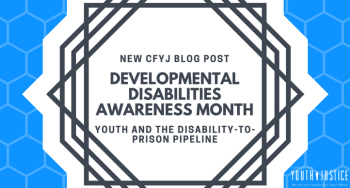March is Developmental Disabilities Awareness Month: Youth and the Disability-to-Prison Pipeline

By Aprill O. Turner, Communications Director
March is Developmental Disabilities Awareness Month, which aims to increase public awareness of the needs and potential of those with developmental disabilities.
It is during this month that we are reminded that children and youth with disabilities are overrepresented in the criminal justice system. Numerous studies show that special education students and those with emotional or behavioral disorders, or learning disabilities are arrested and incarcerated at a higher rate than their peers. Disparities in the treatment of youth in the juvenile and adult criminal justice systems is not limited to just racial and ethnic disparities or gender—in fact, according to a report by the National Disability Rights Network, 65-70 percent of youth in the justice system meet the criteria for a disability, a rate that is three times higher than that of the general population. Summarizing practices in schools, juvenile justice and child welfare systems, NRD's research also consistently finds that despite what we know about brain development and the success of child-youth centered, family involved, community based services—we still consistently try to “discipline” the disability out of children, often by incarcerating them in inhumane conditions, without access to their families and the necessary services to get them connected and prepared to succeed as adults.
Furthermore, the school to prison pipeline can even have more harmful effects for a young person with developmental disabilities. A report released last year by the Ruderman Family Foundation shows that children with “non-apparent disabilities” — meaning those not immediately visible, such as learning disabilities, autism, Crohn's disease, or mental illness — are routinely criminalized rather than given the educational accommodations to which they are legally entitled.
Failure in understanding how to properly support youth with developmental disabilities leads to an over-referral of these youth into the juvenile justice system. Once there, any range of scenarios can potentially lead the youth to more severe outcomes, including being direct filed into adult court.
Join us as we continue to raise awareness and shed light on this important issue of youth with disabilities being overrepresented in the criminal justice system. Please use the hashtag #DDawareness18 and #YouthJustice.

